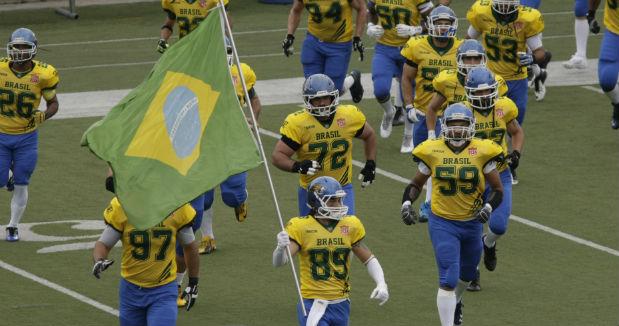Football is getting bigger every day in South America’s largest country

On Sunday, Brazil beat South Korea, 28-0, in International Federation of American Football (IFAF) World Championship competition. The South American country’s first win in IFAF play on the surface looked like just another victory in a four-day tournament.
But for a country so entrenched in passion and pride, it meant much more, especially considering the brief history of the sport in Brazil.
The origins of football started on a beach and really didn’t gain huge popularity until the 1980s thanks to the influx of cable television.
The country’s first national team wasn’t formed until 2007, and the first padded league game between the Coritiba Crocodiles and Curitiba Brown Spiders didn’t happen until a year later.
By contrast, soccer – or futebol as it is called in Brazil – has deep roots. The first club team was formed in 1888. The first national team played in 1914, and by 1930 the country was participating in the World Cup.
Rio De Janeiro just finished hosting the World Cup in 2014. It’s a World Cup that Brazil has won more than any other country, as it has hoisted the trophy five times.
So how hard would it be to sell Peyton Manning in a land so enthralled with Pele?
It’s a lot easier than some might think.
“Football is amazing,” Brazil Men’s National Team head coach Danilo Muller Ribeiro said. “It’s a very exciting game to watch. Brazilians love that part of the game in any sport. Brazil loves competition as well.
“In Brazil, everybody has an NFL team. You don’t watch the NFL just for the game. You have a team just like they do in soccer. They choose the Patriots or the Bengals or the Browns and start cheering. They start knowing who plays where. Brazilians are very passionate about their sports. They take it up because of that.”
Like in the United States, the NFL is the hook. People start rooting for teams and suddenly they thirst for the pigskin.
According to a recent poll by statista.com, Brazil is the third-largest country in the world in terms of NFL fans with its 19.7 million ranking behind only the United States (115 million) and Mexico (23.3 million).
“Brazilians already love football,” Ribeiro said. “They love the NFL. What we need to do as players and coaches is get those fans to come watch our games. It is tough, but once they see on TV that there are good players playing in Brazil and that it’s competitive, they’ll see it’s great to watch.”
Brazil currently has two major national leagues – the Confederação Brasileira de Futebol Americano and Torneio Touchdown – and just about every one of the 26 states has its own federation. Added up, there are roughly 120 full-padded teams playing the game.
The other reason for the sudden popularity pulls at the heartstrings of the country as it can be argued that there might not be a more ardent fan base around.
The country loves a winner and will get behind its people and cheer from whistle to whistle. Current players and coaches are hoping the growth continues through watching the national team.
“The main selling point when we say, ‘Hey, come play on our team,’ is that we’re willing to take any person that his willing to learn, that is willing to go through some hard times,” Brazil wide receiver Heron Azevedo said. “It’s lots of practice and lots of sacrifice with friends and family.
“We’re trying to get lots of people to experience it. That’s why I think the national team is so important. Younger people are going to see it and think, ‘Oh, there’s a Brazilian national team. Maybe that’s the way I can be on a national team.’”
The game continues to grow in Brazil. As evidenced by Sunday’s win, so has the quality of play.
Add it together, and the future of the game looks bright for the largest country in South America.
“I think we are on the right path and that this is the way to show everybody,” Brazil running back Romulo Ramos said. “Because the young people are starting to see the NFL, all families are beginning to see it, too. Maybe this is the beginning of the boom.”
